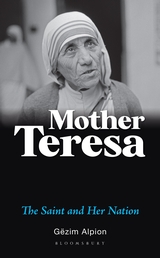Paris, 21 Juin, 2021
Mother Teresa was a very complex figure.
Was she a feminist? Or a ‘religious imperialist’?
If we look at her only as a nun, it would be difficult to understand her in all its dimensions.
Klarabudapost with Gezim Alpion,
in conversation!
KBP – To what extent was Mother Teresa’s role as a woman emancipatory in her main actions towards women and in general?
“Mother Teresa’s work and legacy continue to attract attention after her death as much as when she was alive because opinions about her are sharply divided. In my studies on this religious personality and humanitarian icon, especially in Mother Teresa: Saint or Celebrity? (Routledge, 2007), I engage with the two opposing camps – admirers and detractors – in her literature.
The issue with Mother Teresa’s staunch critics in the media and academia like Christopher Hitchens (1995), Germaine Greer (1990), and Richard Dawkins (2006) is that they barely comprehend her or even try to.
Mother Teresa was not a ‘feminist’ in the conventional sense of the word. Nonetheless, Greer’s superficial understanding and criticism of the nun, as seen from her ‘religious imperialist’ sweeping statement, is rather baffling.
In my recent book ‘Mother Teresa: The Saint and Her Nation’ (Bloomsbury 2021) I return to the issue of the nun’s attitude to authority and church regulations. One cannot understand how revolutionary a nun Mother Teresa is unless one looks at the issue of her attitude towards and preference for the indult of secularization (turning from a vowed nun into a laywoman) in 1948. Had she not secured permission from the Holy See to leave the Loreto order to set up her own Missionaries of Charity congregation in 1949, Mother Teresa was prepared to opt for the indult of secularization (living by the vows while working on her own). This incident on its own illustrates the extent to which Mother Teresa was prepared if necessary to challenge the authority of a patriarchal institution like the Catholic Church.
Mother Teresa’s decision to set up a new religious congregation without requesting financial assistance from the Holy See when this organization was closing religious orders is another example of the important but not properly acknowledged role nuns play in the Roman Catholic Church, where they outnumber priests by two to one.”
KBP – In your opinion to what extent the mentality and being of the ‘Albanian woman’ influenced her leadership?
“In ‘Mother Teresa: The Saint and Her Nation’ (Bloomsbury 2020), I argue that Gonxhe Agnes Bojaxhiu[1] was influenced by two women – her maternal grandmother and mother – during the formative years in her native Skopje where she lived from 1910 until 1928, the year when she travelled to India via Dublin to join the Loreto order. I offer an in-depth analysis of these two matriarchs’ impact on Mother Teresa’s life in my work in progress ‘Filomena: Mother Teresa’s Forgotten Sister’, which is a new biography of the Bojaxhiu family.”
KBP – Who should engage with Mother Teresa?
“In my view, Mother Teresa’s life, mission, and legacy can be better understood if they are approached from a multidisciplinary and interdisciplinary perspective, including Sociology of Religion, Ethnicity Studies, Celebrity Studies, Business Studies, Theology, Missiology, Migration Studies, Post-Colonial Studies, and last but not the least Gender Studies.”
KBP – Who should engage with Mother Teresa?
“Mother Teresa’s life, mission, and legacy can be better understood if they are approached from a multidisciplinary and interdisciplinary perspective, including Sociology of Religion, Ethnicity Studies, Celebrity Studies, Business Studies, Theology, Missiology, Migration Studies, Post-Colonial Studies, and last but not the least Gender Studies.”
[1] Mother Teresa’s maiden name



 Cover Artwork for Mother Teresa
The Saint and Her Nation
Cover Artwork for Mother Teresa
The Saint and Her Nation